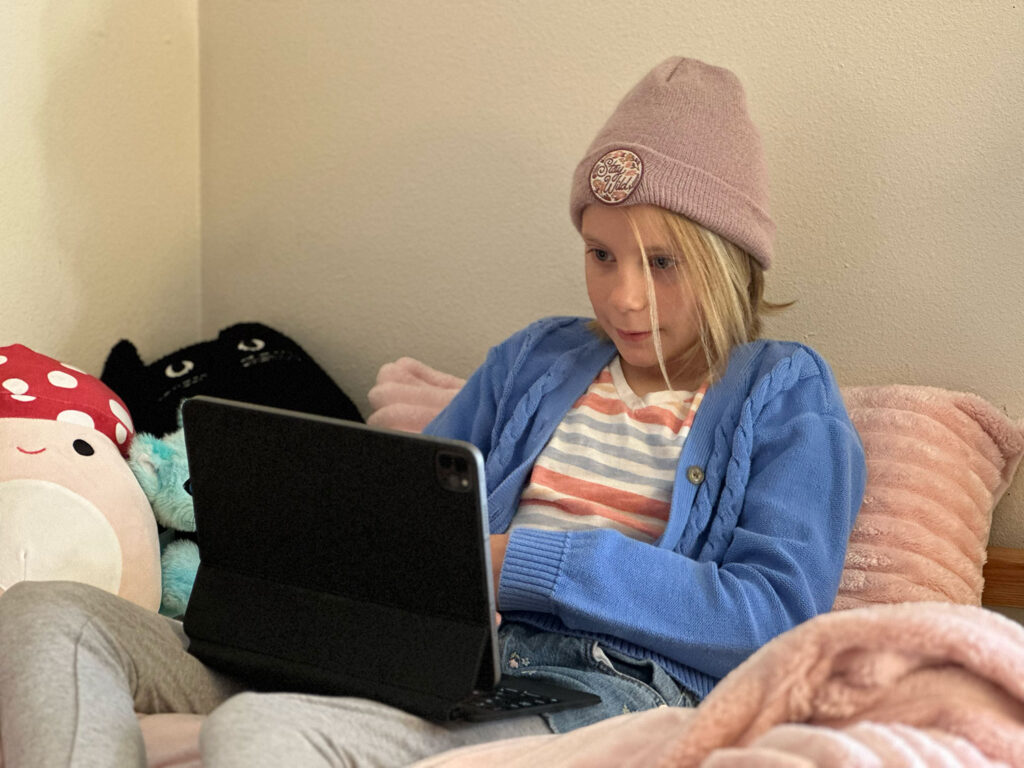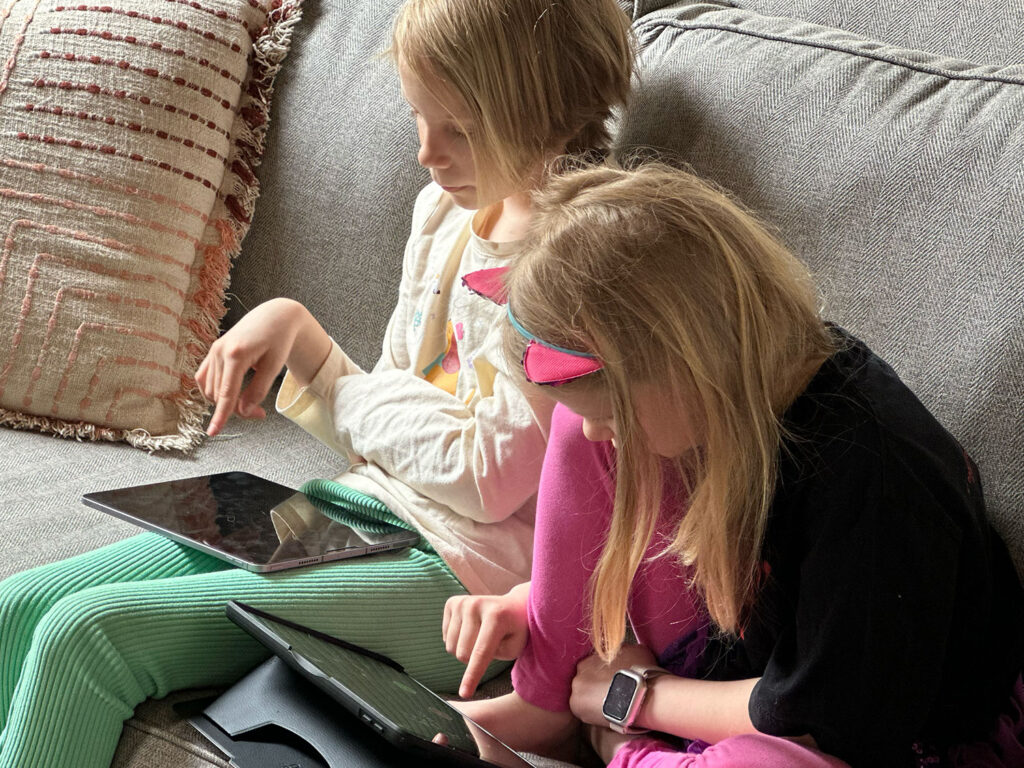
Not All Screen Time is Created Equal
Mindless Device Use vs. High-Quality Educational Apps Like Tile Farm

In today’s digital world, kids are spending more time than ever in front of screens. Whether it’s watching videos, playing games, or browsing social media, the sheer amount of screen time can be overwhelming. However, not all screen time is created equal. While some screen activities can be mindless and disengaging, others can be highly educational and enriching. One great example of the latter is Tile Farm, a math app designed to enhance critical thinking and problem-solving skills. This blog post explores the key differences between mindless screen time and meaningful, educational experiences like those offered by Tile Farm.
The Problem with Mindless Screen Time
Mindless screen time is often characterized by passive consumption. Kids may sit in front of a device for hours, watching YouTube videos or playing simple games that don’t require much cognitive engagement. While these activities can offer a temporary escape or entertainment, they don’t necessarily foster growth or learning. In fact, studies have shown that excessive passive screen time can lead to negative consequences such as:
- Decreased attention span: Constant exposure to rapidly changing, low-effort stimuli can make it harder for kids to focus on more demanding tasks.
- Reduced creativity: When kids consume content passively, they are less likely to engage in imaginative play or creative problem-solving.
- Increased anxiety or stress: Endless scrolling through social media or watching videos can sometimes expose children to negative, inappropriate, or overstimulating content, impacting their mental well-being.
Additionally, mindless screen time is rarely interactive. Kids often consume rather than create, which means they aren’t practicing skills like critical thinking, problem-solving, or even fine motor skills that are crucial for their development.
The Value of Educational Screen Time
On the other hand, high-quality educational apps like Tile Farm provide an entirely different experience. These apps aren’t just mindlessly entertaining; they are designed with a clear purpose—to educate while engaging and challenging the child. Here’s how educational apps can positively contribute to a child’s development:
- Interactive Learning: Rather than passively consuming content, children are actively involved in learning new concepts, applying their knowledge in meaningful ways, and gaining a deeper sense of accomplishment from solving problems that require real creative thinking.
- Skill Development: Educational apps often focus on developing specific skills, whether it’s math, reading, science, or problem-solving. They offer opportunities for kids to practice and improve those skills in an interactive environment.
- Engagement: The best educational apps, like Tile Farm, are designed to be engaging and fun. By incorporating games, challenges, and rewards, they keep kids interested while making learning enjoyable.
- Personalized Learning: Many educational apps adapt to the user’s skill level, providing challenges that are tailored to their abilities. This makes the learning experience more effective in meeting core needs while moving towards exciting new challenges.
- Critical Thinking: Unlike mindless apps, which might encourage simple swiping, clicking, or repetitively grinding, educational apps often require children to think critically. This type of engagement helps to sharpen their reasoning and decision-making abilities.
Tile Farm: A Case Study in Quality Screen Time

Tile Farm is an app that exemplifies the best qualities of educational screen time. Designed to improve math skills, Tile Farm transforms complex mathematical concepts into engaging, hands-on experiences. The app offers puzzles, games, and activities that challenge kids’ spatial reasoning skills, number sense, and creative thinking at levels of simplicity and complexity not found in any other learning software. Here are a few key features that make Tile Farm stand out as an educational resource:
1. Hands-On Learning
Tile Farm’s core design revolves around interactive puzzles where kids must manipulate tiles to create solutions. This hands-on approach allows children to explore mathematical concepts visually and physically, giving them a deeper understanding of numbers and spatial relationships.
2. Problem-Solving Focus
One of the unique aspects of Tile Farm is its emphasis on creative problem-solving. Instead of memorizing math facts, children are encouraged to think critically about how to arrange values to meet certain conditions. This method not only improves their math skills but also helps them develop the ability and flexibility to solve problems across different subjects and in real-life scenarios.
3. Adaptive Learning
The app adjusts its difficulty based on the child’s performance, ensuring that they are always working at a level that challenges them without causing frustration or apathy. This adaptive learning approach helps to keep kids engaged while ensuring they are continuously learning.
4. Encouraging Growth Mindset
Tile Farm also encourages a growth mindset, where kids are praised for their effort and perseverance rather than just getting the correct answer. This approach helps children develop resilience and the understanding that mistakes are part of the learning process.
5. Fun and Engaging
Tile Farm incorporates fun graphics and rewards that keep kids entertained while they learn. The gameplay feels like a game, but it’s actually teaching them valuable math skills. This type of engagement is crucial, as children are more likely to stick with an educational app if it feels fun and rewarding.That said, unlike most learning games that attempt to wrap engaging game elements around the curriculum, Tile Farm has found a way to create profound engagement where every interaction is with math itself.
The Takeaway: Purposeful Screen Time Matters
Not all screen time is detrimental to children’s development. While mindless entertainment has its place in moderation, it’s essential to balance it with educational content that promotes cognitive development, critical thinking, and creative problem-solving. Apps like Tile Farm provide an excellent way to turn screen time into a valuable, if not essential learning experience.
As parents and educators, we need to be mindful of the types of content kids engage with on their devices. Encouraging the use of high-quality educational apps like Tile Farm can help turn screen time into a powerful tool for learning, making it not only a time for entertainment but also for growth, development, and curiosity.
In the end, it’s not about reducing screen time to zero but about making sure the screen time kids do have is filled with quality content that enriches their lives and nurtures a lasting desire to learn.
Sign up now and gain access to the full suite of Tile Farm products!
Use code LAUNCH to receive up to $50 in Tile Farm Maker credit when you subscribe.